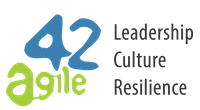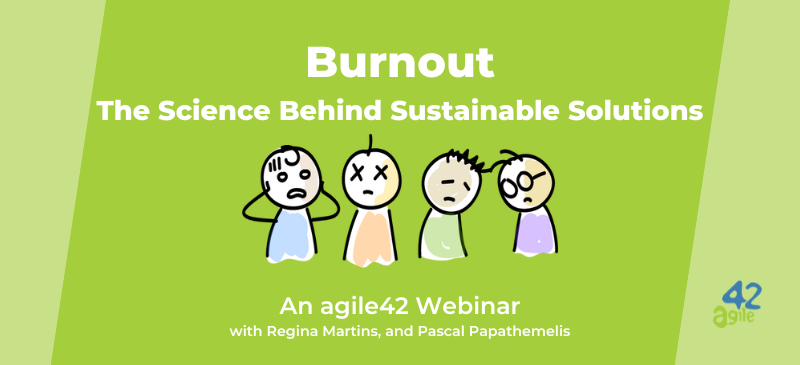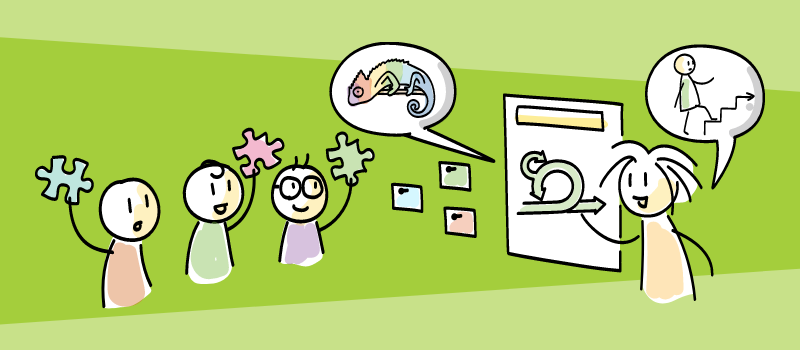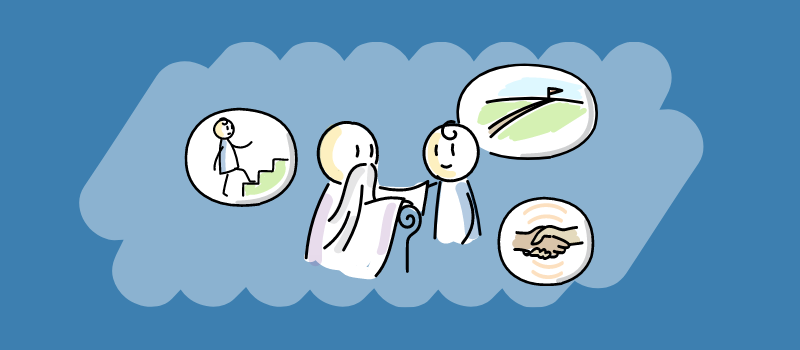Why is mentorship so important?
/by Ninja GranzowMentoring is a relationship centred on personal or professional growth that aims to enhance your skills and help you gain experience in a certain area of your life or work. Many successful people have built part of their professional career on having a mentor. In my personal experience as a mentee, I have found that mentors can guide us through challenges we face, help us grow, and support our lifelong learning process.
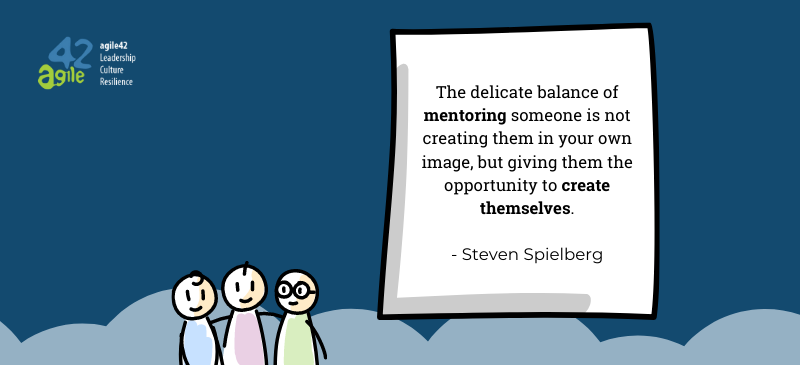
Read on to learn what mentoring is about, what makes it different to coaching, and how mentoring can help you achieve your goals. agile42 also recently hosted a webinar about all things related to mentoring, and you can watch it below.
What is mentoring?
Mentoring serves to transfer practical experience from one person (the mentor) to a less experienced person (the mentee). It is about the mentor sharing their relevant knowledge, experience, and skills while also providing guidance and support. This transfer of knowledge and building of experience is done through discussions, stories, sharing of anecdotes, and advising. Pairing up on practical matters at hand or practical demonstrations of procedures can also help to build up the mentee’s experience.
Because mentoring is focused on the mentees’ personal and professional development, it usually is a long-term relationship which may also contain aspects of career or life coaching. A good mentoring relationship can be a powerful tool for growth, which could lead to a new job, a promotion, or even a better work-life balance. This is why it is never too late for starting a mentoring relationship – it is not limited to your onboarding phase when starting a new job or the early stage of your career.
WATCH: agile42’s Mentoring Webinar
Agile coaches Ninja Granzow and Dennis Becker sat down to talk about their experiences and insights on mentoring, from the perspective of mentees. They answered the most pressing questions about mentoring: what is mentoring, and how does it differ from coaching? How can you set meaningful mentoring goals? They discussed the challenges in times of virtual collaboration, and how to nurture an effective mentoring relationship. Whether you’re a seasoned mentor, you have recently started a new job, or you are simply hoping to expand your skills, this webinar is worth a watch.
Coaching vs Mentoring: What’s the difference?
Mentoring is often confused with coaching, because a good mentor must also be a good listener and a good coach. And vice versa: coaches must sometimes act as mentors. As both coaching and mentoring provide similar benefits, there are a few key differences. To understand the differences, we need to explore what both coaching and mentoring are about in more detail.
What is coaching?
My personal coaching experience is as a Systemic Coach: in other words, a coach who works with the system. Systemic Coaching is non-directive, which means that it does not offer advise or direct solutions to problems. Rather, the focus is on asking the right open-ended questions, as well as providing trust, confidence, and space, for the coachee to have an effective and deep conversation and start to find their own solutions.
The coachee usually has a need to address a specific theme or change, even if they cannot yet put this into defined words. The coach’s task is to help the coachee to define or refine this topic, reach their objectives and consider how to achieve more by finding capabilities within themselves. The information, interpretations, goals and actions all come from the coachee and the coach merely facilitates discovery through discussion. The approach to address the change is and remains up to the coachee.
In professional relationships, coaching encourages individuals to perform in their roles, which often requires specific forms of coaching like Agile Coaching. Agile Coaching is the art of helping people see reality using an agile and lean perspective and change their paradigms, habits, and roles accordingly. It borrows a lot from Systemic Coaching. However, where the Systemic Coach is non-directing, the Agile Coach usually has an agenda of making the team more agile. As Agile Coaching has two very different sides (agility and coaching) there could also be teaching, role-modeling, advising, and mentoring involved in the process.

How is mentoring different?
While coaching is about providing a safe space for a journey of self-discovery, mentoring is focused on transferring specific learnings from an experienced person to a person who wants to develop a specific area of interest. As an example, when I joined agile42, I was mentored by a more experienced Agile coach, who provided guidance and direction. In my own experience as a mentee, mentoring typically is less structured and more informal than coaching. Even though I recommend having a mentoring meeting agenda and goals at hand (and it is up to you as a mentee to put this together), coaching normally follows a more rigorous structure for having a conversation.
Why is it important to have a mentor?
For me, as a person committed to lifelong learning, it is helpful to have a mentor for staying focused in terms of my development path. There are so many interesting areas of learning, and I can easily get lost with too many options. I am grateful that I can regularly exchange ideas and thoughts with my mentor and get a different perspective on my plans and development.
Personal growth and development is about learning: learning new skills and behaviours, discovering blind spots, and constantly expanding existing knowledge. This makes both mentoring and coaching extremely effective learning techniques that can dramatically improve your individual growth and performance.
Being mentored could help to deal with situations you do not feel confident with because you have never done them before, lack insights, or need feedback. Mentoring helps with increasing confidence and developing interpersonal skills. This also includes exploring your comfort zone and expanding it step by step. You could learn from your mentor in order to prevent you from stepping into very common traps.
From a company’s perspective, mentoring can increase employee engagement and retention, and also provides a great opportunity for mentors to learn more about different personality types, contexts, and points of view.
How to set mentoring goals
As a mentee, I found that achieving a goal was only possible after first getting to know my improvement areas, both short and long term, and across various aspects. I recommend asking yourself the below questions, and making notes on your responses:
Skills and experience
- What do you want to accomplish professionally in the next three months?
- What do you want to know or do within the next year?
- Can you do it in your current role and with your current knowledge and experience?
- Are there any formal requirements you are currently missing?
Personal growth and development
- What are you good at, and what are your major areas of improvement?
- What do you want to focus on? Do you want to double down on your strengths or rather work on the things you find challenging?
- What do you admire others for? How can you work towards those characteristics yourself?
You can start by brainstorming high-level dreams and then break down your lofty ideas into individual goals that you are more likely to accomplish through short-term learning cycles.
There are a number of strategies and methods for defining your mentoring goals.
SMART goals
One strategy to create effective and realistically achievable goals is to use SMART goals. These are goals which are:
- Specific;
- Measurable;
- Achievable;
- Relevant; and
- Timed.
The graphic below explains a little more about each aspect of a SMART goal:
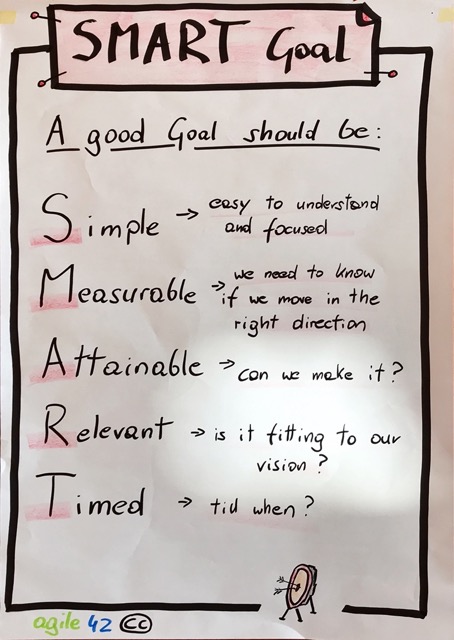
Competency Mapping
Another option is a technique called competency mapping. It is easy to do and you could even create smart visuals like a matrix in order to create a living artifact you update regularly.
Here’s how to do it:
- Start by listing all relevant tasks you need to be able to do, as well as the skills required to deliver these activities. You could also group competencies that are relevant to identify “core competencies”. This is a step where a mentor could provide direction and input.
- Next, run a self-assessment by comparing these competencies to your current experience. This allows you to identify areas of improvement which is a great input to define specific goals. You could easily combine this with using the SMART technique.
Your mentor could also support you by guiding you through this assessment. When you have found suitable goals for yourself, your mentor can support you by helping you with the following:
- What you explicitly need to achieve those goals. For example, is it about knowledge transfer or trying out certain steps to build experience? Expanding your comfort zone?
- What small steps can you take towards the goal to make rapid progress?
- Your mentor can report from their own experience and give suitable examples.
- You can get “self-help” by asking your mentor to find helpful training.
Reflecting on goals
Your mentor can help you to achieve your goals by constantly providing constructive feedback and guidance towards your goal. For example, I usually plan to revisit my mentoring process every 3-4 months or after I have reflected on bigger steps of personal development. Together with my mentor, we then talk about what to change or add. The more specific you can define your goals, the easier it will be to focus on the right things and also find a matching mentor .
How to choose a mentor
When choosing a mentor, one of the most important aspects is to find a person you trust. This is a good basis to open up and talk about your blind spots, improvement areas, and challenges you want to overcome.
I believe that relationship-building and interpersonal skills are crucial in this context. Because this is a very individual thing, pay attention to your gut feeling. Who do you look up to in your network? Does this person have an honest and keen interest in helping you grow? Make sure this person sees mentorship as an option and not an obligation.
Mentoring should be built on solid and concrete advice, guidance, and first-hand experience, so your mentor also needs to have the knowledge and skills in the area in which you aim to grow.
Last but not least, the right person should provide dedicated, long-term commitment. Based on my personal experience, a motivating, encouraging energy helps to spice up your development journey. A good mentor is also someone who is open minded and can learn from you as well – a good mentoring relationship is not a one-way street.
Do you need a great mentor?
If you’re in a period of change or transition and you need to find the perfect person to guide you, get in touch! agile42 offers mentoring services, with certified mentors who are able to help you grow both personally and professionally. They can customise the offering to suit your specific needs, and provide professional guidance in any aspect of leadership, Agile, Scrum, and more.
Author
-

Ninja first came into contact with agile values, principles and practices from the perspective of a team member and appreciated a valuable collaboration. She gained further experience as a program manager in a scaled agile environment and as a Scrum Master and Agile Coach in various companies, mainly in the context of digital product development. As an Agile Coach, Ninja guides teams on their journey towards valuable and sustainable collaboration. She is committed to lifelong learning and has therefore also started training as a Systemic Coach.
View all posts
